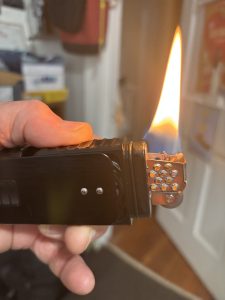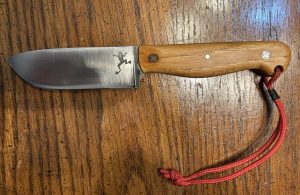
THE MOST IMPORTANT PERSON ON A CANOE TRIP is… !!!
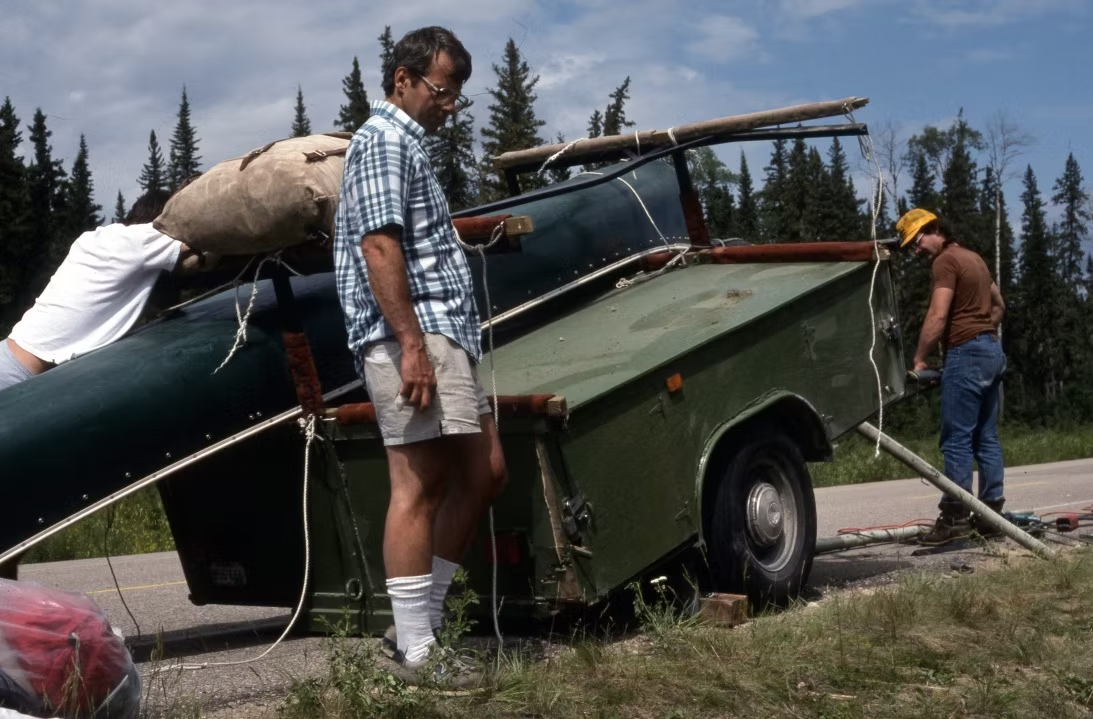
Bad stuff sometimes happens on canoe trips — and it’s not always on the river!
Location: about 20 miles southeast of LaRonge Saskatchewan, enroute to the Cree River.
Most mechanics rely on systematical trial and error to solve problems. They figure that if they replace enough parts, they’ll eventually find the difficulty. At the other extreme, are a small number of experts who, like my friend, Chic Sheridan, have the uncanny ability to correctly diagnose problems on complex machines they’ve never seen before. For example, I once purchased an old Ford Pinto at an auction for next to nothing. The car had a horrible clanging sound which was diagnosed as stuck valves. Repairs would cost hundreds of dollars!
I drove the beast over to Chic’s house, hopeful he could provide a less costly solution. “Add a quart of tranny fluid to the crankcase every time you change oil,” he pronounced. “Old mechanics trick — should free those valves in minutes: works much better than anything you can buy.”
Chic’s advice was sound: I drove the old Ford for two more years then traded it for another beater.
On another occasion, a friend asked me to ask Chic about a clutch problem she was having with her 1980 Saab. The clutch wouldn’t engage properly, and the car wouldn’t shift right. A local foreign car repair shop told us the throw-out bearing and clutch plate were bad. “About 600 bucks,” grinned the youthful mechanic. Chic never owned or drove a foreign car. A strong union man all his life, he supported “buy American,” and a belief that domestic cars were, as he put it, “better than what comes across the ocean.” So, it came as quite a surprise when he agreed to look at the old Saab.
The engine compartment of the Saab was a nightmare of wires, boxes, and hoses. I was certain it would take a trained Saab mechanic to find the clutch, let alone fix it. Chic peered wistfully under the hood, then asked if the clutch was mechanical or hydraulic.
“Hydraulic,” I said.
“I see someone just put a new master cylinder in here,” he drawled. “Yeah, two weeks ago,” I affirmed. Then there was a long silence, followed by…”Well I’ll be damned, the idiot never hooked up the hydraulic line!” Chic shook his head in disgust, grabbed some tools, and a few minutes later the car shifted fine. Cost of repair? Two beers and a “thanks, good buddy!”
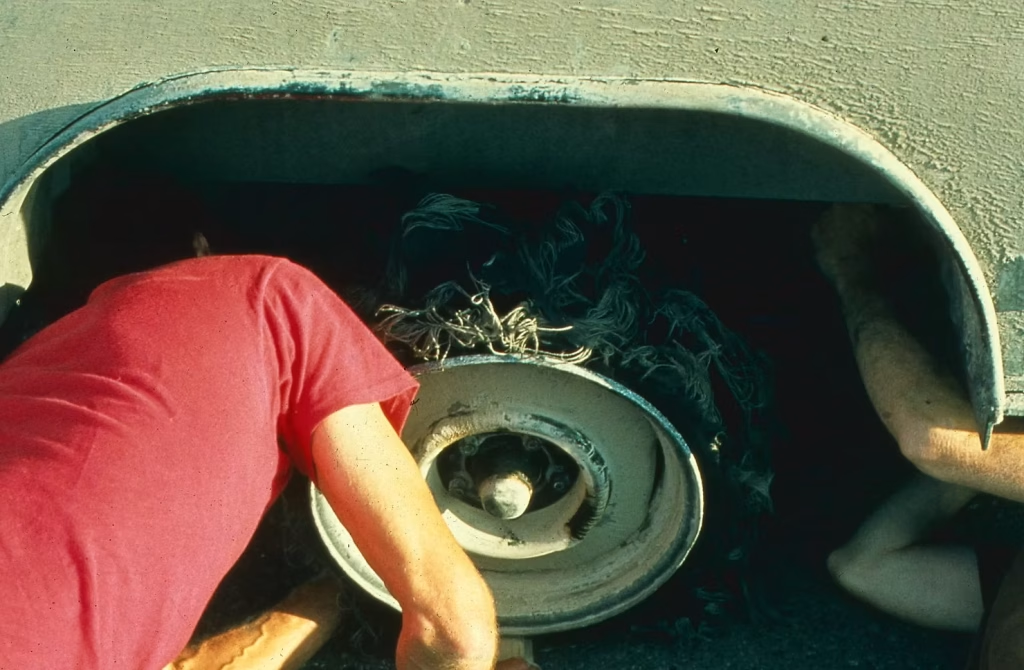
I’ve had more “car problems” on canoe trips than “canoe problems.”
MacKenzie Highway, Northwest Territories, Canada.
Chic was also an inventor and master welder. He made me a stainless-steel grill which I use on my canoe trips, and a quarter inch thick aluminum griddle that fits on my trail stove. He also designed the best canoe trailer I ever owned (plans are in my flagship book, CANOEING WILD RIVERS, 5th Edition). For Christmas one year, he gave all his canoeing friends collapsible, wood frame bucksaws which he built in his shop.
Chic earned his living as a maintenance chief in an ammonia plant just south of St. Paul, Minnesota. He hated the work, often saying that he wished he could have gone to college and become a forester or wildlife professional. Chic’s heart and soul were in the forests of northern Minnesota and Ontario. He fished, camped, and canoed with his friends every chance he got.
Socially, Chic lived in two worlds — the strong blue-collar environment of his workplace and the stressful white collar atmosphere of his college educated canoeing friends. Chic valued education and was envious of our advanced degrees, even though we never mentioned them. On every trip he would remind us that he had been a poor student in high school, then questioned why we included him in our lofty group. At this, we’d go into our routine, and like little kids, reinforce the obvious:
“Because we love you and respect you and think you’re wonderful,” we chorused. Then we’d pass around our guarded store of Peppermint Schnapps and toast the most important person on any backwoods trip — the one who could keep the truck running, fix the trail stove, mend broken equipment, and keep us entertained with bad jokes for hours! “To Chic,” I would call! At this, everyone would shout, “Here, here,” and the bottle would go around again.
Chic didn’t cuss very much. Except for an occasional “dammit,” or “sonuvabitch,” he was clean lipped. This was in stark contrast to two members of our fraternity who swore constantly. Chic never said anything about the foul language — that is, until the day he gave us “the shower bag.”
We were about to canoe the Fond du Lac River in northern Saskatchewan when a family emergency developed which caused Chic to drop out. There was time enough to find a replacement, but it wouldn’t be the same. Besides, we knew how much Chic looked forward to these annual canoe trips. So, we took up a collection and bought him a new Stearn’s life jacket — a brilliant gold “Deliverance” model which, in 1979 was state-of-the-art for paddling whitewater.
Chic was touched by the gift, and a week later, he presented us with one of his own. “It’s a solar camping shower,” he grinned. “Now you guys can finally clean up your act!'”
The apparatus consisted of a black plastic bag, a long delivery tube and shower head. You could fill the bag directly with hot water or set it in the sun for a few hours. The shower seemed like a good idea, so we agreed to take it along.
The unit worked as advertised, that is, when we could find a solid support for it. Five liters of water weighs over ten pounds — an uneasy, slippery load that had to be raised above our heads each night. First, we’d look for a high rock ledge that was wide enough to hold the bag. Failing that, we’d search for a strong tree limb. Tall pines and birches were abundant on the eskers but were otherwise nonexistent.
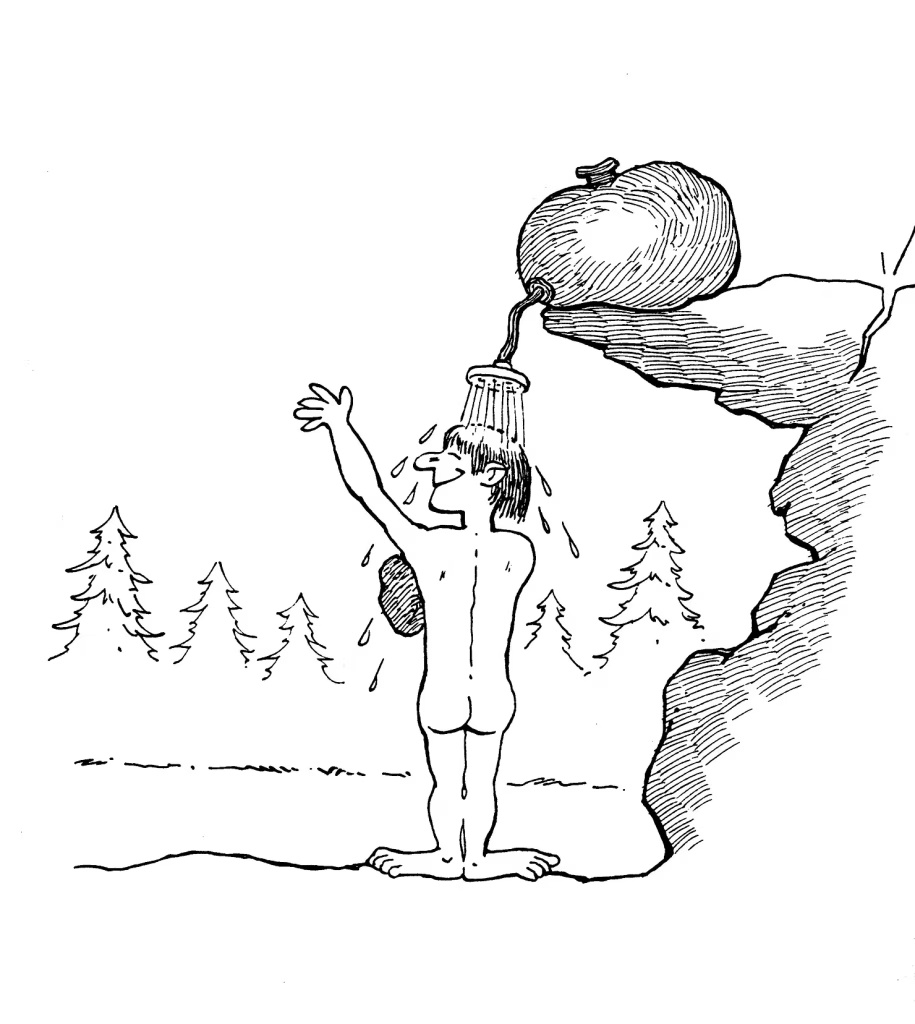
From my l..o..n..g out-of-print book, CAMPSITE MEMORIES –
available as an e-book and Audible version.
What to do? In desperation, we lashed together a tripod of canoe paddles, then carefully balanced the bloated water bag on top. Since the bag was barely three feet off the ground, we had to stoop low, or lie down to get enough water pressure to produce a steady flow. The procedure worked okay when the bag was full of water, but not when the supply was half exhausted. Once the shower bag lost its shape, it came splashing down.
After several frustrating trials we decided that the only way to ensure adequate water pressure — and our own safety — was to have one person hold the water bag on top of the tripod while another took a shower. This method proved reliable, so we adopted it as policy. After a week of this silliness, we gave up on the shower, agreeing never to let Chic know how much we hated it.
A few weeks after the trip, we gathered at Chic’s house for a party and slide show. As we flipped through the pictures, we paused extra-long on those which showed the shower. Finally, we came to our tripod, and proudly asked Chic what he thought of it. Chic knocked the ashes out of his corncob pipe and took a long deep draw on his Michelob. Then, with dead pan expression he asked: “Why didn’t you guys just put the bag on the ground and step on it? Then, you wouldn’t have to build that silly thing every night!”
* Chic Sheridan died of ALS (Lou Gehrig’s disease) on February 20, 1987. He was 67 years old.
—————————————————-
My flagship book, CANOEING WILD RIVERS, 5th Edition, contains a wealth of advice on how to safely canoe difficult rivers.
My book CAMPING’S TOP SECRETS, 2022 revision, details practical camping tips and procedures that only the experts know. If you know just a few of these tricks, you’ll be a hero to your friends!
*My teen book, JUSTIN CODY’S RACE TO SURVIVAL! mixes a fictional wilderness survival tale with practical outdoor tips everyone should know — a first for books of this type. Adults love it too!

